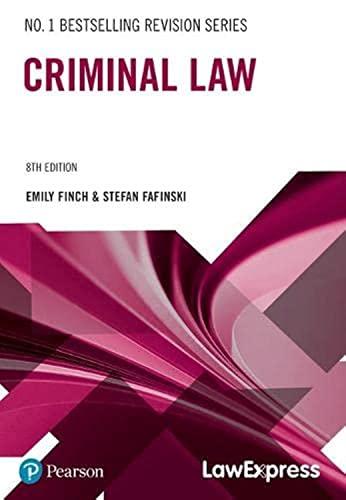PICK ONE OF THE 4 CASES WHICH YOU WOULD DEF WANT TO TAKE TO TRIAL AND PURSUE TO THE FURTHESE EXTENT OF THE LAW AND WHY? ALSO WHAT PUNISHMENT DO YOU WANT TO GIVE THAT PERSON? PICK ANOTHER CASE WHICH YOU WOULD WANT TO AGREE TO A PLEAD DEAL AND WHY? EXPLAIN YOUR ANSWERS FULLY!!!
Dirgctions: With your regular partner you will try to come up with plea bargains for each of the scenarios listed below. One pair will play the prosecutors and one pair will be the defense. You will then come up with a plea bargain that fulfills the requests of both sides. Prosecutor Sheet Role-Plays: You are the prosecutor and represent the government in enforcing the criminal laws. You have a very high case load. At most, you can go to trial in one of the following four cases. Therefore, you must work out plea bargains for at least three of the defendants in the cases below. As a prosecutor, you are able to decide what the criminal charges are against defendants, whether to even bring criminal cases against defendants, whether to dismiss criminal charges, whether to reduce a criminal charge to a lesser charge, and what recommendations you might make to the judge to impose an exceptionally high amount of imprisonment or to impose a sentence in the standard range set by the state Legislature. When there is more than one count or charge, each charge may receive a separate term of imprisonment. You can recommend that these terms of imprisonment run at the same time or back-to-back. (For example, if two terms of three months' imprisonment are imposed by the judge. If they run together, the defendant serves three months in jail. If they run back-to-back, the defendant serves six months in jail.) Directions: in the cases that follow, you will be approached by the public defender to negotiate about the charge and/or the sentence. Negotiate as you deem is necessary. Case One: Ward has been charged with first degree robbery. He was arrested for robbing a furniture store after an informant notified the police that Ward had told him he had committed the robbery. Ward has no prior history of criminal activity. Case Two: While being held for shoplifting at a Thriftway store by two store employees, Chester pulled a knife and stabbed both of them. The two employees had several stab wounds that were life threatening and required surgery and several days in the hospital. Chester is charged with two counts of first degree assault. The knife has never been recovered as a piece of evidence. Case Three: Watson committed at least five burglaries in January and February. She is charged with two counts of burglary in the first degree. The search of Watson's apartment turned up items that had been taken from the two burglaries. There is a possible question as to whether or not the search was done legally. Case Four: David is charged with rape in the third degree by a woman who was a passenger in his taxi cab. David totally denies the charge, but there is very strong circumstantial evidence against him








